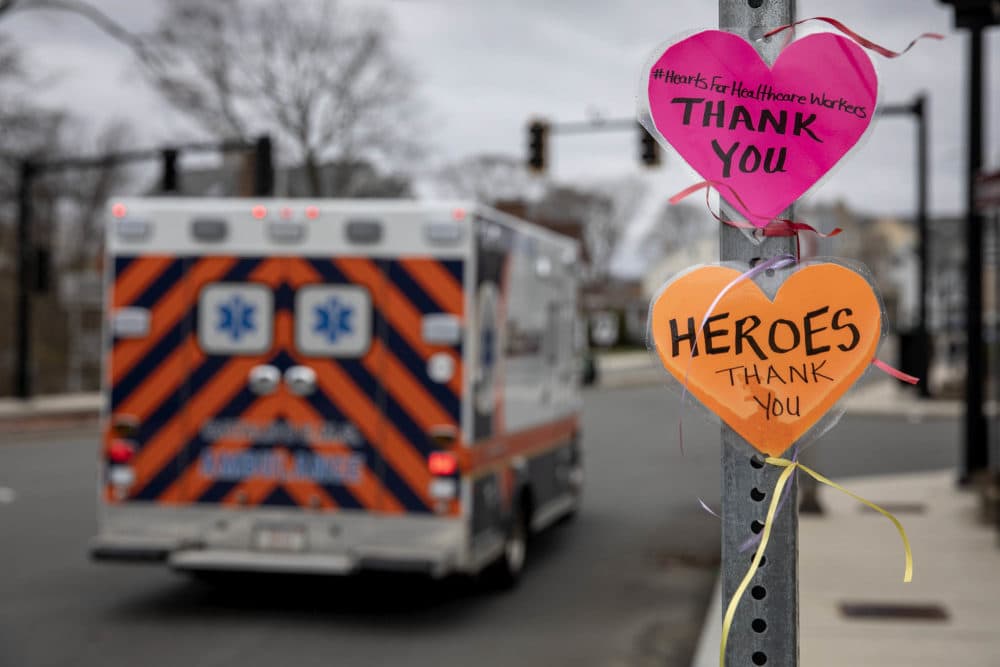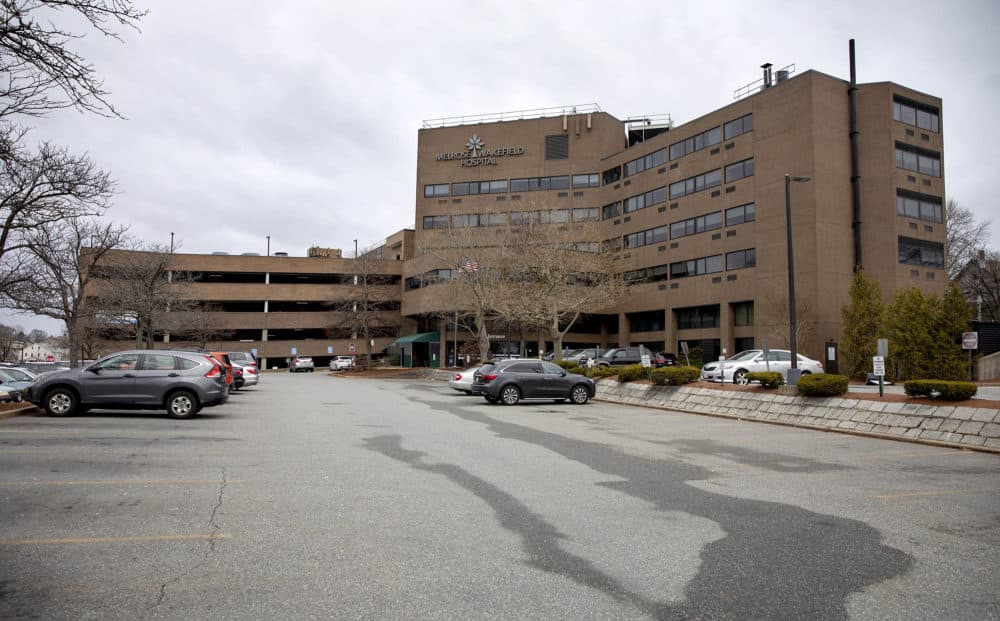Advertisement
Coronavirus Coverage
Anxiety, Furloughs And Treatment In The Halls: Community Hospitals Respond To The Coronavirus
Resume
A few dozen of the acute care hospitals in Massachusetts are community hospitals. They don't have the same resources as the large teaching hospitals backed by big universities.
But community hospitals are very much in the thick of things when it comes to taking care of people with COVID-19, according to Steve Walsh, president and CEO of the Massachusetts Health and Hospital Association.
"They're actually seeing more [COVID-19]-positive patients on the front line in some ways, because they're the line of first defense." Walsh said. "People are not traveling as far right now. People are indoors, so if they are getting sick, they're presenting at the community hospital sometimes first."
For a look at how one community hospital is faring in the face of COVID-19, WBUR's All Things Considered host Lisa Mullins spoke with Dr. Steven Sbardella. An emergency physician, he's chief medical officer at Melrose-Wakefield Hospital.
Sbardella said that, as of Thursday afternoon, Melrose-Wakefield had 23 inpatients known to have COVID-19, along with six suspected cases. A number of staff members had been infected with the coronavirus — fewer than 20 across different departments of the hospital, according to Sbardella, who said many of those cases are thought to be a result of community spread.
And of course, he said, the hospital is expecting more patients sick with COVID-19.
Interview Transcript:
We have 12 designated ICU beds. And right now we have ... 11 patients in that ICU [including six with COVID-19]. We have three [medical-surgical] floors. And what we have done is we have created specialty isolation units on those floors. So we essentially have 34 isolation beds that are available to us. We have 29 cases [of COVID-19] right now. So that is almost filling those isolation beds; and we're waiting for [possible] negative tests on some, and we can move them off those isolation beds. So right now, for us, it's manageable.
Lisa Mullins: It's manageable. But as you said, just for intensive care, you have 12 beds; 11 of them are filled right now. Are you just waiting for that 12th patient, or 13th patient, to come in? And what happens then?
We are planning in our process the number of ICU-like beds that we could handle based on the number of ventilators that we have available to our hospital right now ... and that number is 22. And that's a combination of regular vents, travel vents which we've converted into regular vents, and then anesthesia machines, if we, in fact, had to do that. So what we would do is ... if we reached our max in our ICU and had the spillover, we would spill over into one of our specialty units and use vents there.
But what we're doing before we do that is we have a very good working relationship with [partner institution] Tufts Medical Center right now. And we have decided that when [our] ICU is full, which we have been in the past, in non-COVID days, we would transfer the patient to an open ICU bed in our academic medical center partner.
So you sound fairly confident in your ability to handle the load as it is right now. What happens when the anticipated surge comes, which could be as early as next week?
Then, what we're also doing is we are preparing beds to be placed in the hallways and spines of our hospital.
In the hallways, though, is this for COVID-19 patients?
It would hopefully be for non-COVID-19 patients, but we can't count on that. And we're actually building separations and doing the electrical work in the walls as if we may have to do that.
What is your supply of personal protective equipment?
It's adequate for us right now. But we have been very conservative in our use of personal protective equipment. And what we did was instead of haphazardly placing patients, we cohorted are our patients immediately [in designated isolated areas]. So we can control the use of personal protective equipment, to limit it to just the staff working in those areas.
Do your nurses right now use the same mask, for instance, all day long, and the same protective gear all day long?
In the areas where we've cohorted patients into the isolation area, what we're doing is we're scheduling staff members to work in that area so they can have extended use of personal protective equipment. What we have not done, up until today, was re-use of equipment. So we define re-use as you've had it on all day, you've taken it off, you've finished your shift, you come back the next day and use the same mask.
The FDA just approved the use of certain sterilization, re-sterilization processes — for example, aerosol hydrogen peroxide. So last night we initiated a process where we are starting to do that to re-sterilize an N95 mask [with staff getting their same mask back the next day, with their name on it].
This is obviously an incredibly difficult situation, but you're an emergency physician. Would you feel comfortable using the same mask, day in, day out?
Yes, I would.
Because you have to? Because this must be far from best practice.
The way I look at that is, best practice would be [to] give people the best possible protection when the supplies allow the protection to be there. We are in a situation, I think, where the world is changing and we're modifying what we think we can do. And people are becoming very innovative.
Can you think of one moment where perhaps one of your employees came to you — one of your colleagues — and just seemed exasperated? Something that you think exemplifies what's happening right now at your hospital?
Yes. I had one of our colleagues come into my office crying.
Was this a physician? A nurse?
A physician, really anxious about their ability to protect themselves and protect their family when they go home ... So I really try to go down the road of letting people know that it's OK to feel vulnerable, and that the most courageous people are the ones who can feel vulnerable and keep moving forward.
But what can you say if that person's worried about their family? I mean, legitimate worry about contaminating their family?
Well, I say it's an absolute possibility. But look how you're protected. And then I go through the little bit of science we know about this, explaining it's a droplet. It's not aerosolized all the time ... You're doing the best you possibly can. If you can't work right now, please tell me. I'll let you go home ... The anxiety level of all our clinicians and support staff is very high, and it waxes and wanes at different levels, but it never goes away. What feels good about that is they come back to work the next day.
Financially, I wonder how you're doing. Hospitals across the state have had to cancel elective procedures, other nonessential visits. They did so weeks ago. As a community hospital, how's that affecting your bottom line?
It's having a big effect on us. We've done the same thing. We've canceled elective surgeries, elective procedures; we're only doing emergent procedures and really urgent procedures. We're actually going through a process now where we're furloughing employees and staff with the intent of bringing them back.
How many?
I don't know the number. We're just presenting it to the staff today, and we're going through that process today. It's a difficult message, because we're furloughing people at the time when the surge is coming. But we have to survive financially. This is a big hit for all institutions.

This segment aired on April 2, 2020.

